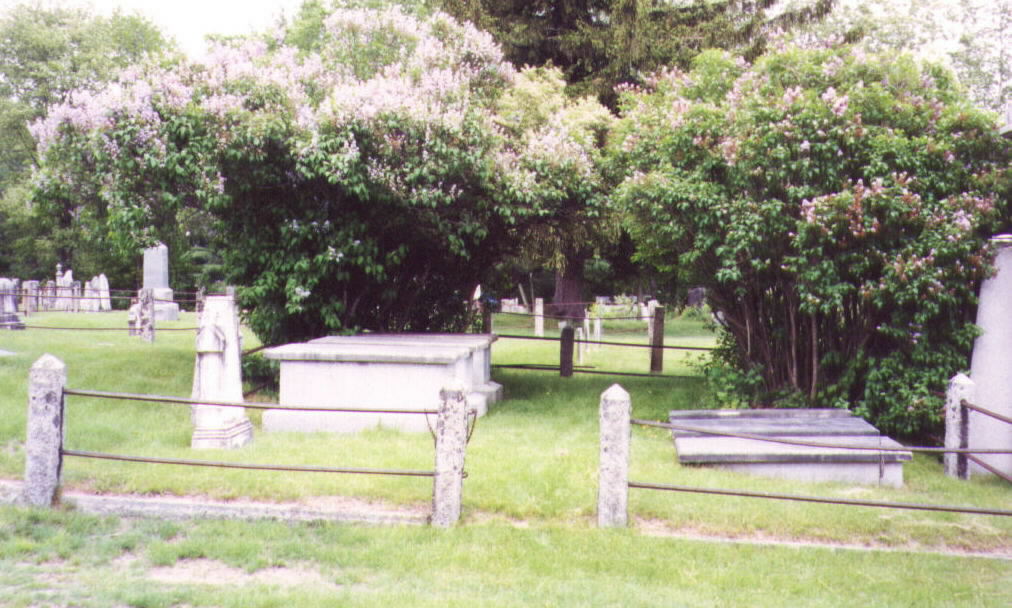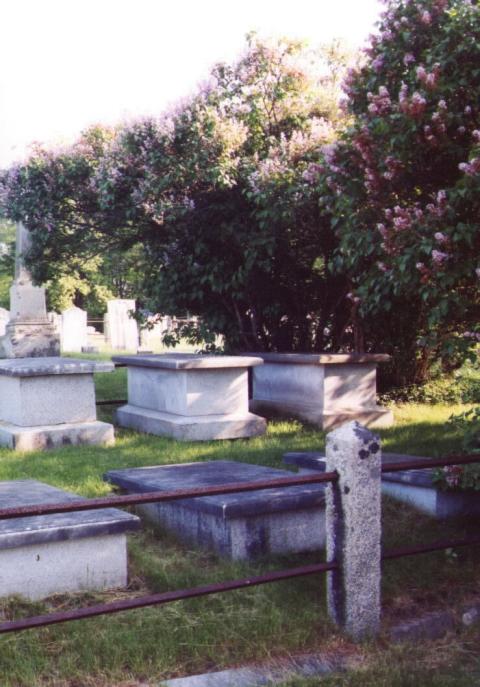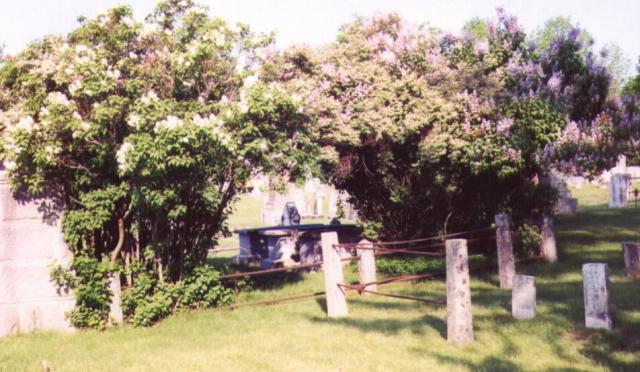Main Contents & Search
.
Sarah Orne Jewett's Grave
Description of The Jewett family plot in the Portland Street
Cemetery
on Agamenticus Road, South Berwick, Maine.
by Terry Heller
The Jewett family plot stands near the center of the cemetery.
The photos were made in June 2003. More appear at the end
of this page.

A fenced in square, with lilac bushes in the back corners.
Left front to back: Theodore, Caroline,
Sarah, Mary.
Right front to back: Edwin Eastman, Caroline
Jewett Eastman, Theodore Eastman.
Only father Theodore has an upright stone;
the others are sarcophagi.
Inscriptions
|
of MARY RICE JEWETT Daughter of Theodore Herman and Caroline Frances Jewett Born in Exeter New Hampshire the eighteenth of June 1847 Died in South Berwick the twenty eighth of September 1930
"The eternal God is thy refuge, and |
THEODORE JEWETT EASTMAN M.D.
"And now he hath set sail
|
|
of SARAH ORNE JEWETT Daughter of Doctor Theodore H. and Caroline F. Jewett, Born the third of September 1849 Died the twenty fourth of June 1909
"Until the day break |
CAROLINE AUGUSTA JEWETT
The flower fadeth: but the word
of our God
|
|
of Mrs CAROLINE F. JEWETT Wife of Dr Theodore H. Jewett of this town and daughter of Dr William Perry of Exeter New Hampshire. Born the eleventh of December 1820. Died twenty first of October 1891.
They are all gone into the world of light
|
of EDWIN C. EASTMAN Born the eleventh of April 1849 Died the eighteenth of March 1892
He asked life of thee and thou gavest |
| DR THEODORE JEWETT
|
. |
Selections from "Beside the Grave of Maine's Beloved Sarah Orne Jewett"
By Sadia Costello Hanscom
(Written for Lewiston Journal.)
Lewiston Journal May 18, 1935.
If you too, have found joy and inspiration in Sarah Orne Jewett, then come with me at Spring's awakening time, and stand beside the grave of this woman, this writer who has preserved for generations to come, pictures of the "Country of the Pointed Firs," with its bayberry and wild rose lanes, its broad sea views, and, most important of all, the best side of its 19th century rural people.
Think with me, as we stand reverently here of the sweet and wholesome philosophy of Miss Jewett, as disclosed in her writings.
"Dying seems, after all, a simple and blessed thing, and one forgets the lifeless body in a sudden eagerness to follow the living soul into the new world." [from "Andrew's Fortune"]
And again; "Yet it only makes one sad to think it is autumn with the flowers, or with one's life, when one forgets that always and always there will be Spring again." [from "An Autumn Holiday"]
And yet again: "The life in me is a bit of all life, and where I am happiest is where I find that which is next of kin to me, in friends, or in trees or hills, or seas, or beside a flower when I turn back more than once to look into its face." [from "An October Ride"]
"God must always be putting again to some use the life that is withdrawn; it must live because it is life." [from "An October Ride"] And we wonder as we stand here, to what use her life has been put in that other world of which she was sure.
For nearly twenty-six years her spirit
has lived over there, and we, too, feel sure that her work is
going on, unhampered by that body which caused her so much
weariness during her life here.
The Jewett Family Lot
This cemetery lies only a short distance from the center of the village of South Berwick where the Jewett house stands. The family lot is near the entrance, at the right, and is enclosed by stone posts connected by flat iron rails.
Here lie the bodies of Dr. Theodore H. Jewett, his wife, three daughters, the youngest daughter's husband and son. Dr. Jewett, the father, was the first to go, and his grandson, Dr. Theodore Jewett Eastman, the last. There will be no more for Dr. Eastman never married and he was the last of that fine family. The story of sorrow and grief on this spot is closed. [...]
This [Dr. Theodore H. Jewett's] is the
only upright stone in the lot. The other six are marble slabs,
the size of the graves, laid flat on granite uprights. It seems
a bit odd to have this one upright stone there, but when we stop
to think, we know that the wife and mother had this stone
placed, and while the daughters preferred the flat ones, they
did not wish to change that which their mother had chosen for
their father.[...]
Some Bits of Sentiment
Under the grass on Dr. Jewett's grave lies buried a bit of sentiment. This is what Miss Sarah writes in the Spring of 1905:
"I was saddened when I came home this last time to find that dear, bright, wise Bobby, father's tame little bird that he was so fond of, was dead. There never was a little creature with so true and good a heart. He knew so many things--tho not one trick! And he would chirp at me until I answered and spoke to him, and then would sing himself almost to pieces. How often I have laughed and begged him to be still; and now that live little voice is still enough and its wisp of grey feathers. John and I put him in a little box, and buried him when nobody else knew it, down under the grass on father's grave, where so much sweet cheerfulness lies still already. It was one of the dear links with those old days, and I can't help thinking that Bobby's spark of life is not put out altogether." [See Fields, Letter 123]
John, to whom she refers, was the coachman and man-of-all-work for the Jewett family for many years.
And here is another bit of sentiment connected with this spot. Sarah never outgrew her dolls. On September 3, 1897, she wrote: "This is my birthday, and I am always nine years old." [See Fields, Letter 73]
There was one doll especially beloved by her, and friends tell us that after Sarah's death, the older sister, Mary, had fashioned each year, a new dress for this doll. When Miss Mary died, one of the faithful maids, Mary or Katy, attended to having this doll buried with the mistress.
So the little grey bird and the
beloved doll found places in the family lot in the cemetery.
Her Loved Ones Pass On
With Dr. Jewett's death, came his daughter Sarah's first real sorrow. On his long rides about the country she often accompanied him, and he talked with her as with an old and understanding friend, and so it came that "nothing that belonged to his mind or his work was foreign to her." [See Fields, Preface]
Her mother was the next to go, and then her sister Caroline's husband, while the sister herself died in 1897.
After Miss Sarah's death, the older sister, Mary, who had for many years been foremost in the affairs of the village, "seemed to gather the community into her arms, to become more and more its friend, counsellor and helper in all its joys and sorrows. Everybody in and around South Berwick came to her for everything," says Laura E. Richards in her book, "Stepping Westward".
Only six months after the death of his aunt, Miss Mary, Dr. Eastman, the last of the family, passed on. Just as Dr. Jewett was beloved and trusted family physician in South Berwick and surrounding towns, so was the grandson, Dr. Eastman, in his chosen field, Boston and vicinity.
"Sarah Orne Jewett looked at nature in its milder moods, and at mankind in its more subdued states of tenderness and resignation. She knew the rough side, but she simply did not emphasize it," is the way Francis Otto Matthiessen puts it in his biography.
Mrs. Annie Fields in her "Letters of Sarah Orne Jewett," says, "Her desire was to lay open for other eyes to see, those qualities in human nature which ennoble their possessors."
Those of us who are familiar with Miss Jewett's stories know this to be true. She emphasized the best always.
Writing to Willa Cather, from her own experience, she gives this advice: "We must be ourselves, but we must be our best selves. If we have patience with cheapness and thinness as Christians must, we must know that it is cheapness, and not make believe about it." And she goes further with this: "You must write to the human heart, the great consciousness that all humanity goes to make up, otherwise you can write about life, but never write life itself."
Miss Jewett knew this for early in life she decided, that she was "not going to write moral tales. She was going to write, not about life, but life itself." [See Fields, Letter 144]
We know that she did not deviate from
this chosen path, for always she entered into the homes and life
of the people which she pictured, leading her readers there with
her.
Miss Jewett's Last Years
Never strong as a child or as a woman, a carriage accident in 1900 left her to suffer much until her death nine years later, and in those years South Berwick came to be more and more her home.
Once she wrote to a friend, "I have had such drear times trying to play well, when I wasn't," and at the last she wrote, "Dear, I do not know what to do with me." Then it was that her friends knew the time was at hand for her to lay aside her work here. Her courage had always before been undaunted, and her joy in life great. [See Fields, Letter 145 and the final paragraph of the collection]
Miss Jewett's words written at the time of Longfellow's death, apply well to herself: "A man who has written like Longfellow wrote, stays in this world always to be known and loved--to be a helper and a friend to his fellowmen." [See Fields, Letter 4]
And so, with reverence, we stand on this sacred ground in the little South Berwick cemetery, and we know that of this family it may be said as Miss Jewett herself put it when writing of a family long gone from a deserted farm; "God keeps them yet; somewhere in His Kingdom they are in their places--they are not lost." [from "An October Ride"]
Notes
Caroline F. Jewett's motto is from Henry Vaughan (1622-1695), a Welsh mystical poet who wrote in English. "They are all gone into a world of Light!" appears in Silex Scintilans (1655) and begins, "They are all gone into a world of light! / And I alone sit lingering here; / Their very memory is fair and bright, / And my sad thoughts doth clear." Jewett uses this allusion several times in her writing: see "A Native of Winby," "Mrs. Osgood of Bar Mills," and Fields, Letter 119.
Sarah Orne Jewett's motto is from the Song of Solomon 2:16.
Mary Rice Jewett's motto is not actually readable, but Hanscom affirms the text supplied here, which is from Deut. 33:27.
Edwin Eastman's motto is from Psalms 21:4.
Caroline Augusta Jewett's motto is from Isaiah 40:8.
The source of Theodore Jewett Eastman's motto has not been
discovered; assistance is welcome.

Sarah's grave is in the middle of the second row.
The Eastman graves are in the first row.

Looking into the plot from the east side.
Edited and annotated by Terry Heller, Coe College.